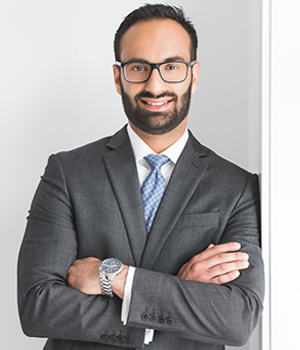Resident Spotlight: Dr. Rahul Verma, Paediatrics
 For Dr. Rahul Verma, PGY2, Paediatrics, working with children and their families is a feeling like no other. “Children are a unique population of patients where early interventions and timely care can change their life trajectory for decades and decades to come.”
For Dr. Rahul Verma, PGY2, Paediatrics, working with children and their families is a feeling like no other. “Children are a unique population of patients where early interventions and timely care can change their life trajectory for decades and decades to come.” With a passion for clinical research, Dr. Verma is studying respiratory diseases in children and serves as the resident representative on the Paediatric Research Committee. He is also involved in a social advocacy project that aims to improve the way paediatric trainees communicate with adolescents about vaping and e-cigarette usage.
What has been the most rewarding aspect of residency?
As a paediatrics resident, I consider every day that I am working with children and their families to be rewarding. Children are a unique population of patients where early interventions and timely care can change their life trajectory for decades and decades to come. This is what attracted me to a residency in Paediatrics and it is what I keep in mind every time I meet a child. Being an active member of a child’s health care team and watching them improve is a feeling like no other.Why did you choose the School’s Paediatrics residency program?
I attended medical school at the University of British Columbia in Vancouver, BC. I chose to pursue a paediatrics residency at Schulich Medicine because of its medium-sized Children’s Hospital that allows residents to gain experience in ‘bread-and-butter’ cases, as well as those that are more complex. Paediatric residents at Schulich Medicine constantly have opportunities to perform a wide range of medical procedures, from lumbar punctures to neonatal intubations.What is the program’s biggest strength?
The biggest strength of the Paediatrics residency program at Schulich Medicine is our tight-knit community. Behind every child’s care, there is a large team working very closely together including physicians, nurses, pharmacists and allied health care workers. As a resident group, we are very cohesive and can always count on each other during difficult times, such as the ongoing COVID-19 pandemic.What learning opportunities have you pursued as a resident beyond the clinical environment?
I am passionate about academic paediatric medicine and clinical research. I am currently the resident representative on the Paediatrics Research Committee. My research is focused on respiratory diseases in children and complex care. This work is based out of The Hospital for Sick Children in Toronto as well as the Children’s Hospital in London. Currently, I am completing the largest systematic review of paediatric tracheostomy decannulation protocols to date. I am interested in learning how institutions across the world assess children with tracheostomies for decannulation. Earlier this year, I also published on the psychosocial risk in caregivers of children with medical complexity and the urgent need to screen these caregivers to best support them. During the onset of the COVID-19 pandemic, I summarized clinical pearls of SARS-CoV-2 infection in children for paediatricians. Recently, I have also reported on the effects of advanced epilepsy treatments on sleep-disordered breathing in children. This year, I also had the opportunity to share my research at conferences including those of the Canadian Paediatric Society, Canadian Thoracic Society and the American Thoracic Society.I am also involved in a social advocacy project aiming to improve the way paediatric trainees inquire about e-cigarette usage in adolescents. Given the increasing prevalence of vaping product use in Canadian adolescents, our hope is to share a unique approach to adolescent history-taking with all paediatric residents across the country. We are planning to create an informative podcast that can be used by paediatric trainees across the country.









